The world has changed drastically in the last two years. Remote work went from nice-to-have to almost mandatory. Hiring and working across borders or relocating to another country are no longer exceptions but proven trends. The scarcity of tech talent worldwide is now bigger than ever, with huge impacts on both local and global tech market contexts.
These changes raise many serious questions, ones that we want to answer with our just-released Global Tech Talent Trends 2022 report.
The Global Tech Talent Trends has an ambitious global coverage and is powered by data from 6.568 respondents worldwide. Its sections — Demographics, Professional Roles, Tech Stacks, Remote and Global Work, Career Management and Salary & Perks—provide insights that not only allow tech professionals to make more informed career decisions under a global perspective, but also help companies to better understand the new nature of the global tech market and how they should position themselves to hire and retain the talent they so desperately need.
Let’s deep dive into some of the interesting insights the Global Tech Talent Trends shows:
Demographics
Two of the things that pop out regarding the tech professionals who responded to the survey is that only 14,4% of them work as contractors or freelancers and that they are in lower numbers in Europe and South America, along with part-timers. This can be a sign of either the tech job market’s stability or its stagnation.
Another interesting finding is the fact that bootcamp graduates and the self- taught represent only 4,2% of tech professionals, clearly showing that most tech pros still prefer university degrees to enter the market. Are bootcamps mainly used for reskilling and upskilling?
Professional role & tech
Not surprisingly, 51,7% of tech professionals that are in developer roles, are in Full-stack, Back-end or Front-end.
Javascript is king, not only is it the most used programming language (15,8%), but Javascript-based frameworks account for more than 60% of total usage.
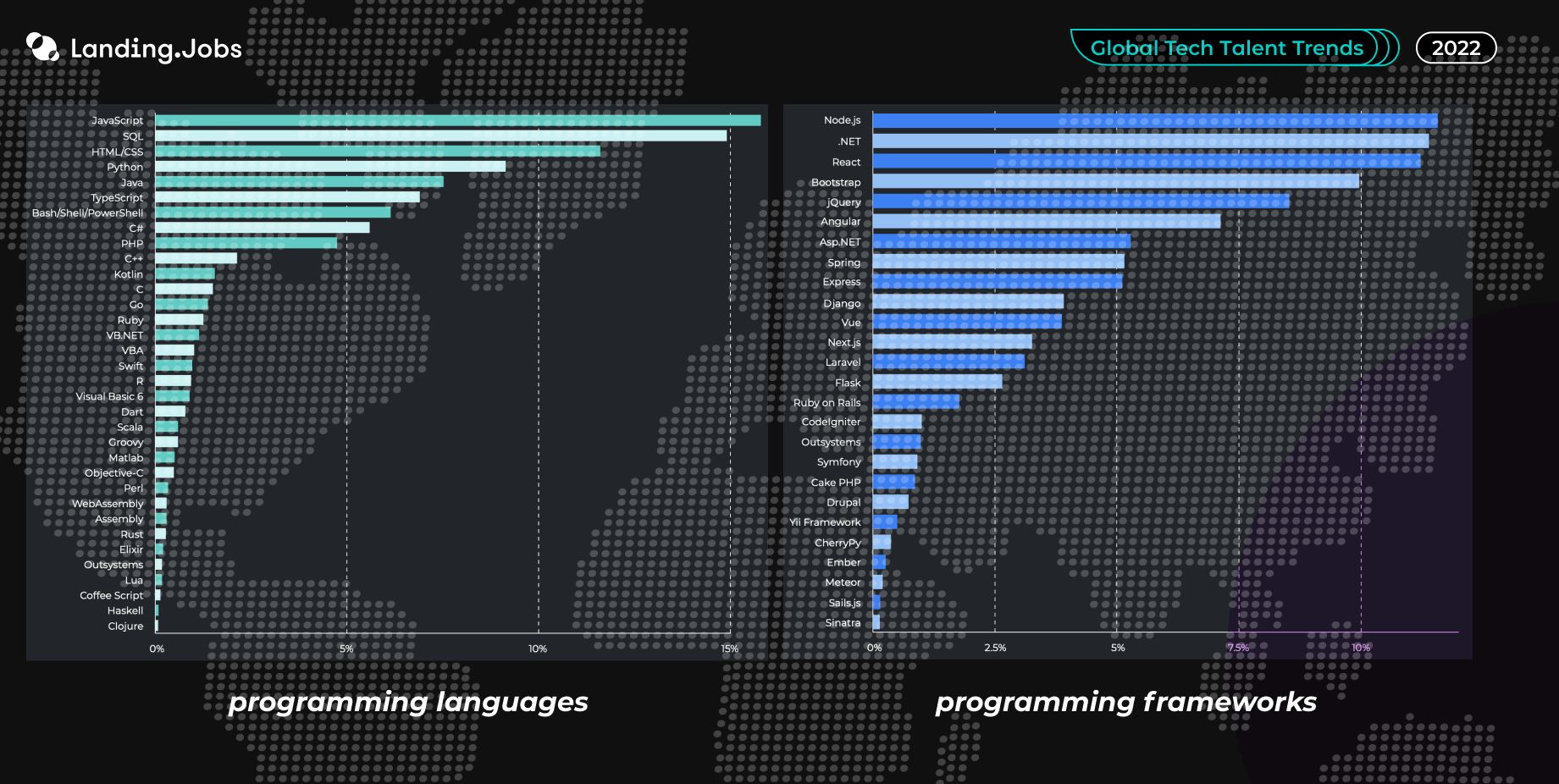
Remote and global work
Regarding the type of work tech professionals are doing, 88,6% of them work full or hybrid remote—highlighting the fact that remote is widespread and here to stay—and 18,6% work remotely for a company based in another country.
Motivation from these tech professionals to work for a company based in another country is high (8.9/10), mainly in search of a better work-life balance, with the ones from Africa, South America and Asia being the most motivated. As for the continent they would most like to work across-borders to, Europe is the winner.
But some professionals also want to relocate to another continent for work, mostly because they’re looking for a higher quality of life. Tech pros from Asia, South America and Africa are the ones most open to relocation (and Europe is the most coveted destination), while Europeans show higher inclination to relocate to a country within the same continent. This is a big sign that Europe is where it’s at in terms of offering what tech professionals are looking for.
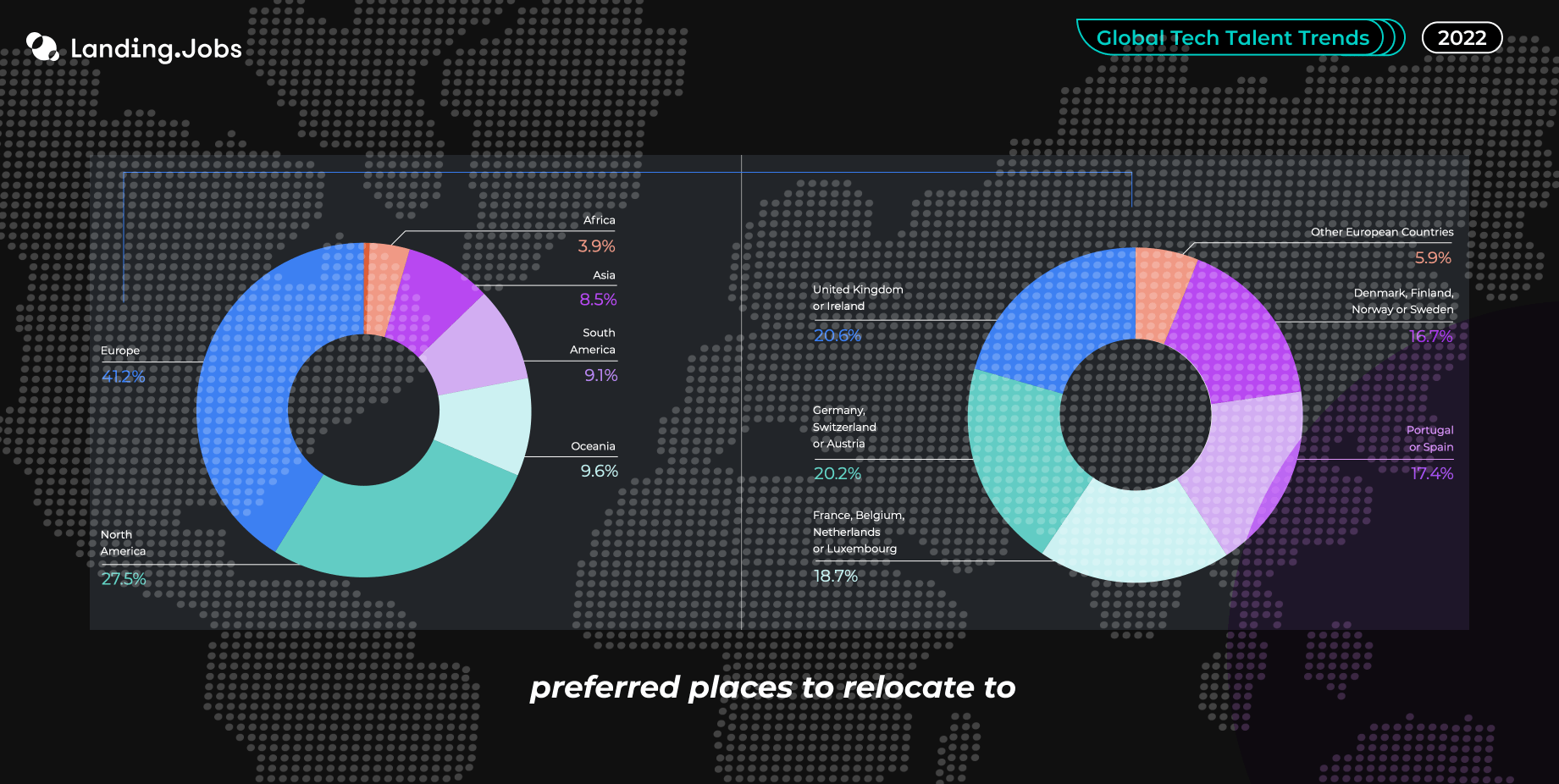
The search for a better quality of life clearly wins over salary and benefits—seems tech professionals are a class not on the lower level of the Maslow Pyramid. The freedom to work wherever they want comes in third, showing the relevance of improving the ownership of their careers and contributing to higher levels of quality of life.
Career management
Regarding career drivers, salary & benefits top the rank (19,2%), followed by work-life balance (16,6%). The motivation to change jobs in the next 3 months is relatively high (7.6/10), but it seems like European professionals are the one least looking forward to it.
Perks
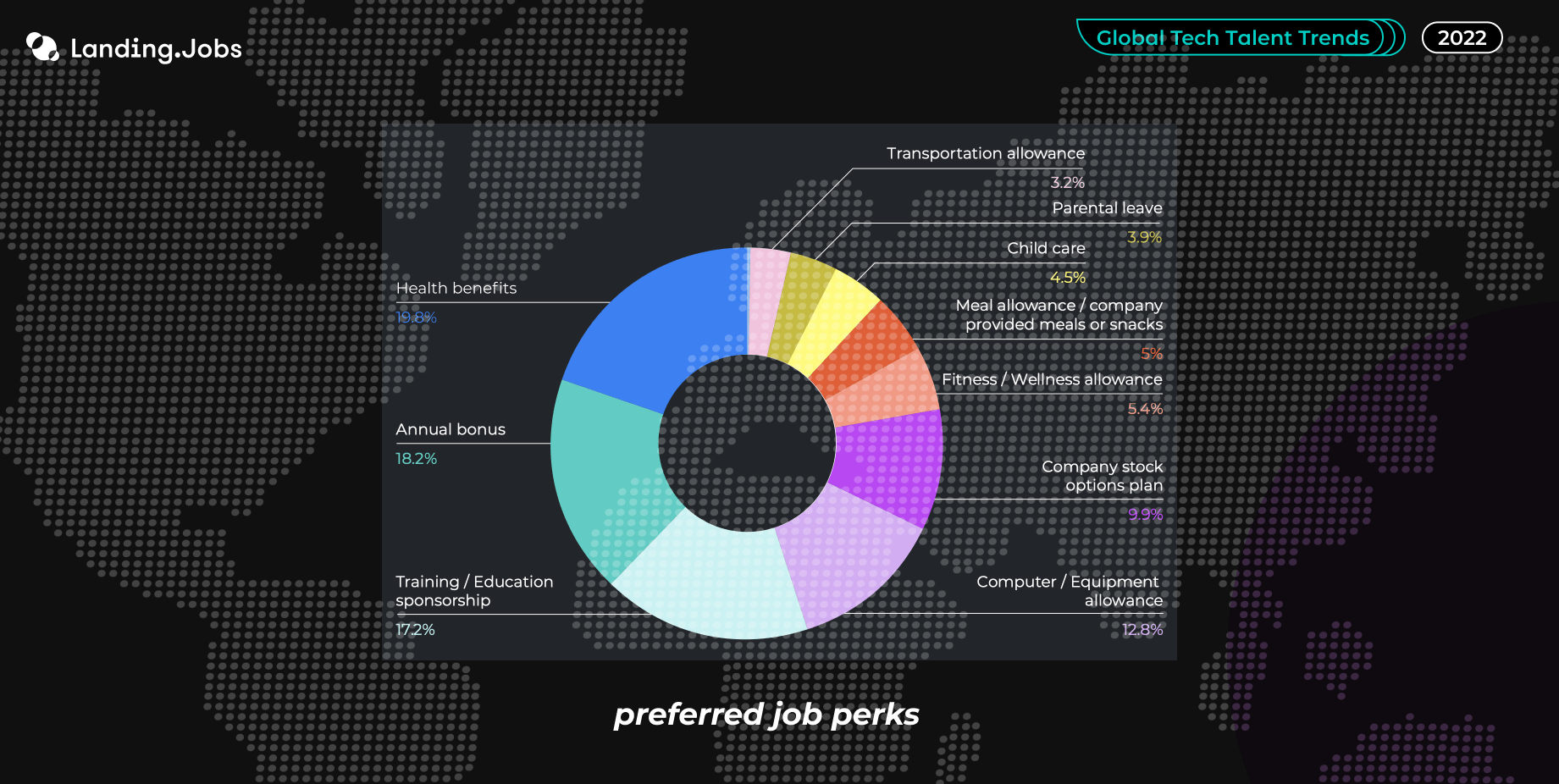
Health benefits, annual bonus and training sponsorship are the most relevant job perks, and the interesting thing is this top 3 rank is the same for all analysed regions, showing a clear pattern on what companies should focus to please tech talent.
Computer and equipment allowance comes as the fourth choice in all regions, showing that tech people surely like tech. Stock options are fifth, showing an interesting evolution of tech professionals regarding possible long-term benefits.
On the lower side of the rank there is paid/extra vacations (is this already a given in all countries?), flexible work schedule (with most people remote has this stopped being an issue?) and team building (no clues here).
Salary
North American tech professionals’ salaries are the highest, Europe gets second place, and Africa, South America and Asia are clearly behind, resulting in an average annual salary range that varies from 20.071€ (Africa) to 84.224€ (North America). And no surprises here: tech management roles earn, on average, 1.4x more than developers.
Local outsourcing is the worst paying company type, with scale-ups on top (average salary is 2x higher than the former). Working for scale-ups apparently compensates (a lot), probably because they assume the best tech talent is a key competitive factor and have the money to invest.
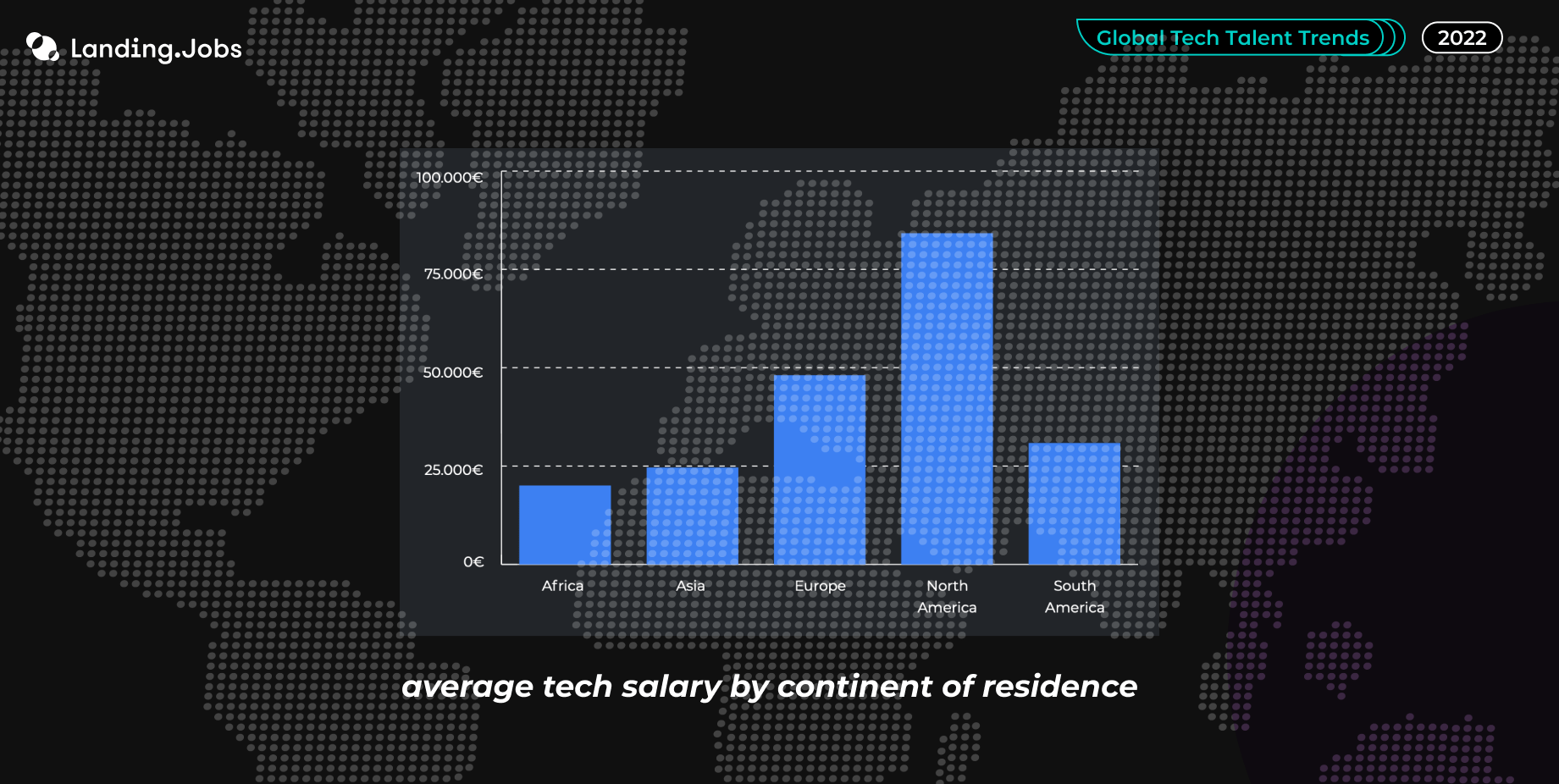
Contractors tend to earn more than full-time employees, showing one of the main tenets of this work option. African and European contractors earn around 45% more than full-time employees, Africans 30% and South Americans only 6%.
Full-office jobs are the most poorly paid (1.9x less than full-remote jobs). The differences can be very significant, and a hypothesis to support this may be because less competitive companies are less inclined for remote work, consequently losing attractiveness to the best tech professionals, and hurting their competitiveness even more. A speculation, but worth debating. The fact that North America is the only region paying less to Full remote than to Hybrid remote is also curious. If you have guesses on reasons for this, please reach out. 😅
Salary raises
60,9% of tech professionals saw their salaries rise in the last 12 months, while 7,5% suffered a decrease. As for gender, men’s salaries varied positively more than women’s (by around 11%), and women saw their wages lowered more than men. Definitely not a good sign for diversity efforts.
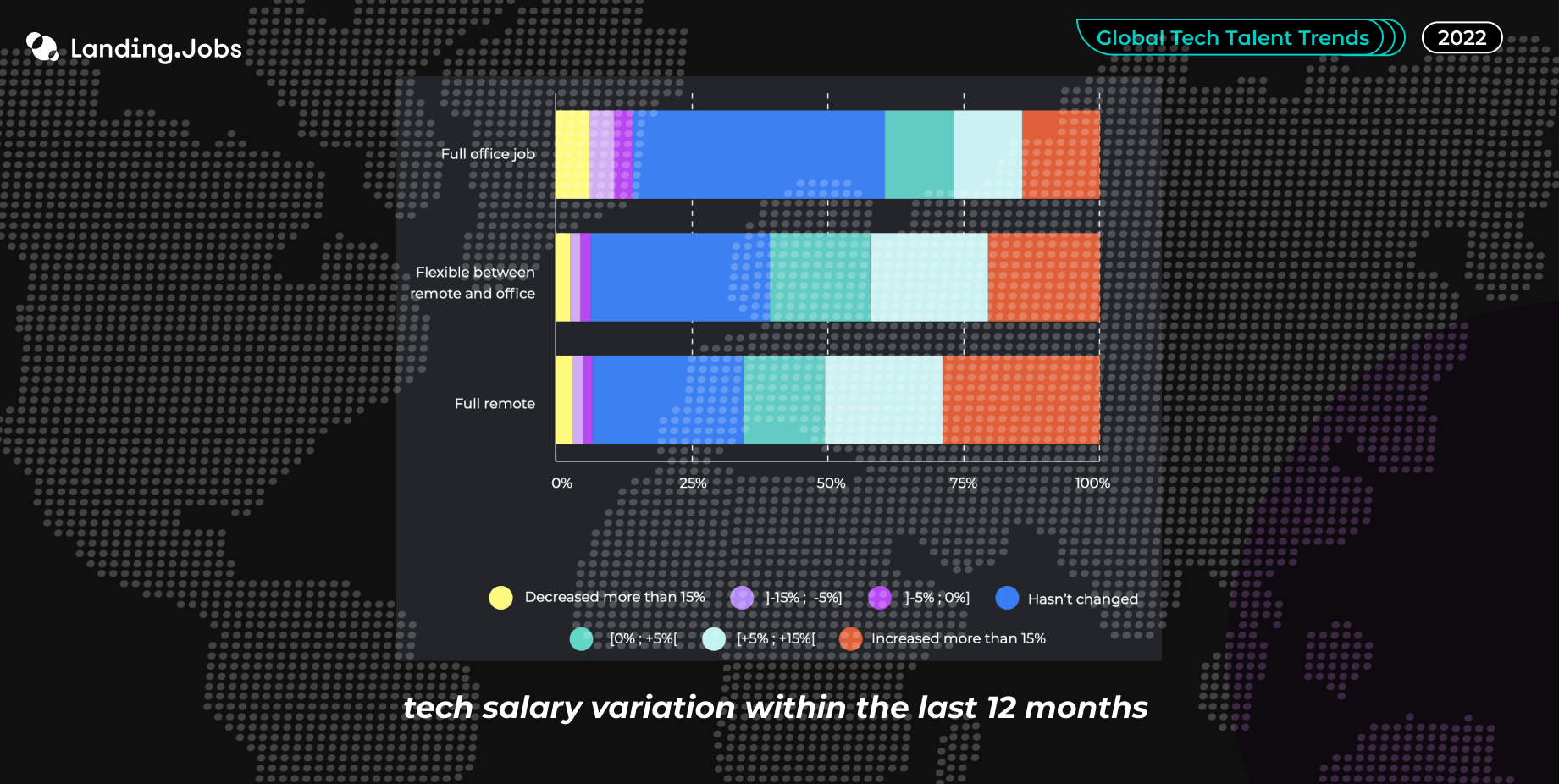
It seems companies that practice full office jobs are really not as competitive as the ones who have some kind of remote work policy. Or is it that tech professionals who prefer office jobs are less demanding? It’s not a simple question, that’s for sure.
With some technical hiccups on the side and a little laughter thrown to the mix, the Global Tech Talent Trends release was full of knowledge and insights yesterday, April 27. Our Chief Marketing Officer, Pedro Moura, led the discussion with our two guest speakers, Fabio Vedovelli (Senior Software Engineer at Circle.com) and Jolly Grover (Senior Talent Acquisition at Signicat), who brought their visions as tech pro and tech recruiter respectively.
It was an exclusive online event for the Landing.Jobs community, who get first-hand access to our best content (join here if you want to be part of it), but now you can download the full report here. 👈
At Landing.Jobs, we believe in the inevitable globalisation of the tech talent market. For that market to work, there’s a need to avoid asymmetry and lack of information. The Global Tech Talent Trends was built by the tech community for the tech community. It’s the first edition, and it’ll be improved each year with contributions from you and other tech professionals all over the world. Please reach out to us with feedback, suggestions or anything else at [email protected].






0 Comments